
News
Behind the Headlines
Two-Cents Worth
Video of the Week
News Blurbs
Articles
Testimony
Bible Questions
Internet Articles (2015)
Internet Articles (2014)
Internet
Articles (2013)
Internet Articles (2012)
Internet Articles (2011)
Internet Articles (2010)
Internet Articles
(2009)
Internet Articles (2008)
Internet Articles (2007)
Internet Articles (2006)
Internet Articles (2005)
Internet Articles (2004)
Internet Articles (2003)
Internet Articles (2002)
Internet Articles (2001)

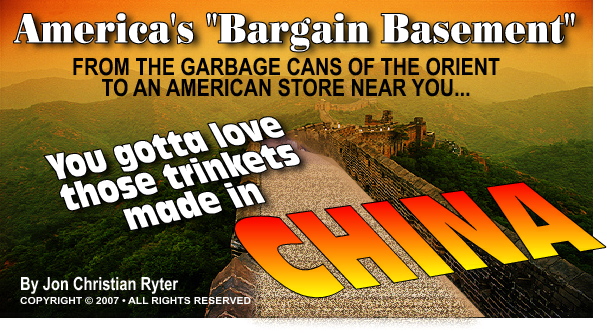
EDITOR'S NOTE: For over 5 years this website has been warning the American consumer about the economic pitfalls of buying goods made in China. Hopefully after the series of eye-opening "Made-in-China" health hazard headlines we've witnessed over the past six months, it should be dawning on the American people that the risk of buying Chinese goods has consequences more immediate than providing the People's Liberation Army with the money they need to modernize their military specifically to destroy the United States. American merchant princes and their financial backers in the banking and industrial communities have wrongfully deluded themselves into believing that by giving China access to the world's most affluent consumer market that China would open its doors and allow the world to sell its wares to the 1.3 billion potential consumers who have never earned more than $100 a year. Utopia is not around the corner. Armageddon is.
 he
People's Republic of China has deluded the American people into thinking
the goods they are selling to the people of the United States are of the
same—or at least a comparable—quality to the merchandise manufactured
in the United States and sold to consumers for higher prices. And, the
American people have deluded themselves into believing that the protection
they get from FDA and USDA regulations extends to goods and food products
imported from communist China. They don't. That's why the American consumer
has purchased pet foods in which the rice protein and wheat gluten imported
from China contained melamine. In
addition to melamine, the rice protein also contained toxic levels of
cyanuric acid. Many people who read the articles about melamine in pet
food dismissed it from their minds because the organic compound which
coverts to ammonia when ingested, was found in animal food and not in
food designed for human consumption.
he
People's Republic of China has deluded the American people into thinking
the goods they are selling to the people of the United States are of the
same—or at least a comparable—quality to the merchandise manufactured
in the United States and sold to consumers for higher prices. And, the
American people have deluded themselves into believing that the protection
they get from FDA and USDA regulations extends to goods and food products
imported from communist China. They don't. That's why the American consumer
has purchased pet foods in which the rice protein and wheat gluten imported
from China contained melamine. In
addition to melamine, the rice protein also contained toxic levels of
cyanuric acid. Many people who read the articles about melamine in pet
food dismissed it from their minds because the organic compound which
coverts to ammonia when ingested, was found in animal food and not in
food designed for human consumption.
Melamine is made by combining urea with formaldehyde. It becomes a synthetic polymer resin that is used to make things like Melmac™ dishes and Formica™ counter tops. A thermoset plastic, melamine is not edible. Why would the Chinese put it in wheat gluten and rice protein? To fool the buyers from the western industrialized nations. Melamine makes the grain appear to be higher in protein to the eye. Thus, it appears to be a good buy for western buyers who are, competitively, trying to save a buck wherever and whenever they can—even if they knowingly compromise the products they will offer their customers (as long as they can camouflage the inferior ingredients).
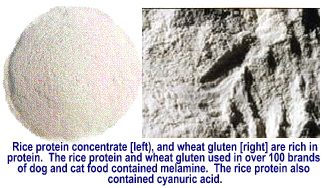 By
fabricating the quality of its food products—for local consumption
as well as for export to the United States and the European Union—Chinese
entrepreneurs accomplish two things. First, they make their food exports
look fresher, healthier and richer than they really are. And second, by
using much cheaper and inferior ingredients in the processing of food
products, China—which universally pays slave labor wages—shaves
even more cost from the products it manufacturers to help it steal an
even larger share of the world market by convincing its global customers
that its products are cheaper only because labor is cheaper in China.
By
fabricating the quality of its food products—for local consumption
as well as for export to the United States and the European Union—Chinese
entrepreneurs accomplish two things. First, they make their food exports
look fresher, healthier and richer than they really are. And second, by
using much cheaper and inferior ingredients in the processing of food
products, China—which universally pays slave labor wages—shaves
even more cost from the products it manufacturers to help it steal an
even larger share of the world market by convincing its global customers
that its products are cheaper only because labor is cheaper in China.
Trading with China has become a life-threatening adventure for the US consumers whose financial circumstances are forcing them to buy the cheap fare offered by a nation which hates our guts. In some cases, the consumers buying the Chinafare might be middle income people with nothing more than a penchant for a bargain and a belief that trading with China is better than waging war with them. Deadly pet food. Toxic toothpaste. Substitute sushi. Self-shredding tires. Non-USDA poultry posing on shipping manifests as dried flowers. Fish containing banned antibiotics. Lead jewelry. Made in China has become an unhealthy acronym for "buyer beware."
America's consumers, like America's premiere manufacturers, are damning the world's greatest democracy to extinction through their greed. In one more decade the United States will lack the manufacturing ability to put together the machinations of war in the event we are threatened by our trading partners—and our ability to sustain that production throughout a major conflict—and still produce consumer goods. In both World Wars I and II the United States not only supplied all of its material needs for its own Army, Army Air Corp and Navy, it also supplied the munitions and war machines needed by its allies—and, on top of that, we fed most of Europe. Today we lack the ability to fight a major two-front war—even with a bee-sting enemy of religious fanatics. In one more decade we will have to buy our fighter jets and long range bombers from Beijing-based Boeing. Those planes, of course, would be sitting on the tarmac on tires manufactured by Hangzhou Zhongce Rubber Co.—the recently recalled defective Chinese tires.
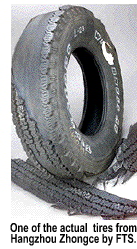 At
the end of June the National Highway Traffic Safety Administration
issued a stern warning to Foreign Tire Sales, a New Jersey-based
tire distributor, who told the NHTSA they could not afford to recall the
half million Hangzhou Zhongce tires it sold to tire distributors
across the United States. The tires—sold under the brand names of
Compas, Telluride, Westlake and YKS—are all
missing gum strips which hold the tire together. Without gum strips, the
layers of the treads will separate, ultimately causing what could be life-threatening
accidents if they occur at high speeds. Two deaths in one accident have
already been blamed on the defective Hangzhou Zhongce tires. When
the NHTSA told Foreign Tire Sales it had an obligation to
recall the tires, FTS responded that it was a small shop with 7 employees—and
without the financial wherewithal to recall and replace almost a half
million tires from China's second largest tire manufacturer. On top of
that, FTS told the NHTSA that it was being sued by the families of the
two men who died when the tires on their car separated. The "who"
who needs to be sued is Hangzhou Zhongce. NHTSA told FTS that the
rules are very clear.
At
the end of June the National Highway Traffic Safety Administration
issued a stern warning to Foreign Tire Sales, a New Jersey-based
tire distributor, who told the NHTSA they could not afford to recall the
half million Hangzhou Zhongce tires it sold to tire distributors
across the United States. The tires—sold under the brand names of
Compas, Telluride, Westlake and YKS—are all
missing gum strips which hold the tire together. Without gum strips, the
layers of the treads will separate, ultimately causing what could be life-threatening
accidents if they occur at high speeds. Two deaths in one accident have
already been blamed on the defective Hangzhou Zhongce tires. When
the NHTSA told Foreign Tire Sales it had an obligation to
recall the tires, FTS responded that it was a small shop with 7 employees—and
without the financial wherewithal to recall and replace almost a half
million tires from China's second largest tire manufacturer. On top of
that, FTS told the NHTSA that it was being sued by the families of the
two men who died when the tires on their car separated. The "who"
who needs to be sued is Hangzhou Zhongce. NHTSA told FTS that the
rules are very clear.  When
an American company imports vehicle parts, they are construed to have
the same liability of the manufacturer of the vehicle. What that means
is that when an American company does business with a foreign exporter,
the American company has an obligation to make sure the merchandise they
are importing meets all US standards—or bear the financial burden
if it doesn't.
When
an American company imports vehicle parts, they are construed to have
the same liability of the manufacturer of the vehicle. What that means
is that when an American company does business with a foreign exporter,
the American company has an obligation to make sure the merchandise they
are importing meets all US standards—or bear the financial burden
if it doesn't.
According to Lawrence LaVigne, the FTS lawyer, when his client bought the tires from Hangzhou Zhongce, they did so only after testing the tires—as required by US law. The tires, LaVigne said, were driven 40 thousand miles. They were then cut and analyzed. LaVigne insisted they met US specifications. When the whole order was shipped Hangzhou Zhongce substituted an inferior tire in place of those FTS ordered. While that sounds like other horror stories from importers who complained they were victims of a shell game hustle with the "pea" being the products the importer thought he was buying. the fact remains that, under US law, the importer assumes the liability for the imported goods.
John Henke, Jr., president of Planning Perspectives, a consulting firm, noted in a comment to Gannett Newspapers that "...any company that is buying things from any developing country has to be more vigilant about the history of those products." Henke also observed that companies which are too small to assume the liability for the products they import should not be importing products—particularly in light of China's history (my observation, not Henke's).
China's less than stellar quality control policies, and a well-deserved reputation as the world's worst product pirate, have forced the FDA to greatly increase its inspection of all types of Chinese imports—which actually means very little since, at the present time, the FDA and the USDA has the ability to check about 1% of all of the imports that come into the country. Increasing its inspections of more Chinese products means more crates of goods from other countries will never be checked, allowing even more contraband—including cocaine and heroin—into the country. Adding their own concerns about the advisability of doing business with China due to the lack of safety standards on Chinese products is the Consumer Products Safety Commission [CPSC] which has now issued 30 safety recalls on Chinese made items containing lead cores. Under CPSC guidelines, there cannot be more than 600 parts per million [ppm] of lead in a jewelry component—the chain, the pendant, the clasp, or a single bead. The jewelry coming into the country—much of it designed for, and marketed to, children—was as much as 99% lead—much, much higher that the 0.006% allowed by US law. Toxic jewelry. But even more, a toxic economic system that is voraciously feeding on the free enterprise systems with which it does business.
 According
to Nancy Nord, CPSC chairman, recalls on Chinese imports are rising
steadily. "It is absolutely imperative," she said, "that
[countries] understand that if they are going to sell products in the
US, consumer protection has to be one of their main concerns.."
According
to Nancy Nord, CPSC chairman, recalls on Chinese imports are rising
steadily. "It is absolutely imperative," she said, "that
[countries] understand that if they are going to sell products in the
US, consumer protection has to be one of their main concerns.."
In response to Nord's remarks, Guo LiSheng, a deputy director in Beijing's Administration of Quality Supervision, Inspection and Quarantine said that while China agrees with Nord that children's health and safety is important, he believes putting warning labels on the lead products that exceed CPSC guidelines should be sufficient, and "...may be more effective than setting the limit of lead content." The CPSC noted approximately 20 thousand children were treated in hospital emergency rooms from 2000 to 2005 after swallowing lead-based jewelry. A 4-year old boy died from lead poisoning in 2006 after swallowing a charm that was 99% lead. Children don't have to swallow it to get lead poisoning. They can ingest hazardous levels of lead simply by sucking on lead-based toys or jewelry, or any product made from lead—or painted with lead-based paint. Lead poisoning can cause autism or other learning disabilities. Over half of the CPSC's recalls for the past two years have been on Chinese imports, not just jewelry products containing lead.
China has never passed CPSC muster—nor have they passed USDA muster either. For that reason China can't legally sell meat products or poultry to distributors in the United States. To the frustration of US regulatory agencies, this has not dampened China's determination to do just that. Over the past year the USDA has seized hundreds of thousands of pounds of non-approved poultry, beef and pork products—not at the docks, but from within the distribution system within the country. In their effort to get the meat products past customs, the crates were labeled as dried flowers, prune slices and/or vegetables and any number of other "safe" categories that don't mandate close scrutiny on the docks. The US government has refused to comment how Chinese meat got into the country undetected. But when you're only checking 1% of the crates on the dock, that means 99% of them aren't being opened.
In the first quarter of 2007, FDA and USDA inspectors rejected 298 food shipments from China. And, even though China is subject to more scrutiny because of its unscrupulous trade practices, only 56 shipments of Canadian food products were rejected. Under USDA rules, countries cannot export meat and poultry products to the United States until their slaughterhouses and processing plants have been inspected and approved by the USDA. None of China's slaughterhouses and processing facilities have been approved.
Despite the fact that China continually sticks its finger in the eye of the world, the world greedily tolerates its violations of political protocol and the blatant theft of trademarks. And although China's slaughterhouses have never been cleared by the USDA—and even with the fear of avian flu—the Bush Administration granted China a waiver to export chickens to the United States. Theoretically, the processed chickens sold to the United States were grown and slaughtered in America, then sent to China for processing, refrozen, and returned to the United States to be sold in American supermarkets. The waiver was agreed upon by the US bureaucracy after intense pressure was applied by the Chinese government—without an ounce of brainwork being expended by the US government. The bureaucracy wanted to create a fable it could use to deny culpability if the avian flu virus ended up in the US poultry food supply.
As TV court Judge Judy says, "If it doesn't make sense, it isn't true." And this doesn't make sense. The purpose of doing business in China is to buy things cheaper than the homegrown versions of the same thing. Logic suggests American companies can't afford to raise chickens, slaughter and freeze them, ship them to China for processing, thaw them, process them, refreeze them and then return them to the United States for less money than it costs to raise, slaughter, and process them in the United States. Thus, logic suggests that the chickens sold to China were consumed in China. And any "American chickens" processed in China for resale in the United States were most likely Chinese chickens from the egg to the drumsticks even though the Bush Administration denies it.
On the heels
of an admission by the Chinese government that wheat and rice protein
concentrate exported to pet food manufacturers in the United States and
Canada contained melamine—a chemical used to make plastics—it
was confirmed that the Food & Drug Administration quarantined 107
food imports from China in April. In addition, over a thousand shipments
of tainted Chinese dietary supplements, toxic 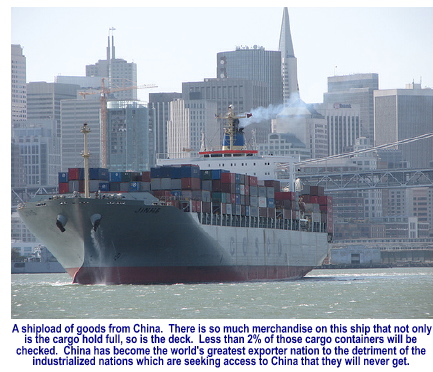 Chinese
cosmetic products, and scores of counterfeit Chinese medicines were also
seized. Every month tons of counterfeit American and European branded
products that were illegally manufactured in China are confiscated in
American ports.
Chinese
cosmetic products, and scores of counterfeit Chinese medicines were also
seized. Every month tons of counterfeit American and European branded
products that were illegally manufactured in China are confiscated in
American ports.
Counterfeit branded goods not only rob the companies which own the brands, they victimize those who purchase them because the counterfeit brands are easily identified as fake when they break down and the buyers find they have no warranty. With pharmaceuticals, the consumers unwittingly pay an even stiffer price for buying fake brands. In Panama and in the Dominican Republic, over 100 people died from ingesting fake cough syrup that contained diethylene glycol, a poison that is used in automobile antifreeze and brake fluid. Because of its sweet taste, the Chinese use it as a substitute for glycerin, an artificial sweetener. The same chemical was found a year ago in counterfeit Colgate toothpaste, leading the FDA to ban toothpaste imports—as well as other questionable pharmaceuticals—from China.
The Chinese simply farm the manufacture of the banned products to companies they owned in other countries and continue to bootleg inferior-grade branded goods. The Chinese moved their counterfeit toothpaste business to South Africa. Last week federal authorities found fake Colgate toothpaste containing diethylene glycol in eight Dollar Power discount stores in Baltimore and Silver Spring, Maryland, New Jersey, and Pennsylvania. The tainted toothpaste is marked "Manufactured in South Africa," even though New York-based Colgate-Palmolive does not contract with any companies in South Africa to manufacture its toothpaste. It was distributed by MS USA Trading Company in North Bergen, NJ. MS USA spokesman Chris Kim denied culpability by saying "...[w]e do not make it. We don't import it. We buy it from a guy...[known to them only as Dialo)." Although the tainted Colgate-labeled fake toothpaste has been distributed only in a limited way in four States, good Colgate toothpaste is sitting on store shelves all over the country and shares for Colgate-Palmolive stock fell 61 cents by close of business last Thursday.
How do you know if the Colgate toothpaste you have recently purchased is real or fake? Colgate-Palmolive said the tainted product comes from South Africa—and its origin is on the box. They further noted that the fake toothpaste packaging contains a number of misspelled words including the incorrect spelling of its theoretic country of origin, "SOUTH AFRLCA," the "South African Dental Assoxiation," and two run-on words, "isclinically." If the Colgate toothpaste you purchased recently says it was manufactured in South Africa—take it back to the store and get your money back. If the store refuses to take it back, take the toothpaste to your lawyer since you do have legal recourse against the store if you purchased a bootleg product from them.
Although pharmaceuticals—and OTC health products—are the current concern, tainted drugs aren't the only problem. Also of concern are food products processed for human consumption from China that should not be here: dried apples preserved with cancer causing nitrofuran, also frozen shrimp, tilapia, catfish, eel, basa (similar to catfish and many times substituted for catfish), and dace (similar to carp—the sewer cleaner of the ichthyological world—which is not a human food product in the United States). The FDA found sardines coated with high levels of bacteria. Chinese monkfish—used as sushi—contained high levels of a toxin that is found from the deadly pufferfish. Over the last few months, several US retailers have begun to audit the "lineage" of the fish they purchase from China to make sure it has not been treated with banned antifungals. Leading the pack is East-coast grocer Wegman's who now trace the seafood they buy back to the farms where it was grown. When they lose track of the fish's lineage, they buy somewhere else. China has more problems with contaminated fish than any other nation in the world. Yet, the prospect of having China open the doors to 1.3 billion consumers is more than the financial-industrial complex can resist—at the expense of the rest of us.
China now supplies the US with 18% of the fish that ends up on the US family table, or is sold in US seafood restaurants, or ends up boxed as frozen entrees in US supermarkets or at your local Wal-Mart store. Today, the US-based Aquaculture Certification Council [ACC] which checks the quality of seafood products for buyers like Wegman's, Darden Restaurants (which owns Red Lobster™ and Olive Garden™) and even Wal-Mart which buys more goods from China that 80% of the nations who buy from China. Asked about their quality control system with respect to China, Wal-Mart,—which spends $18 billion a year in China—responded to USA Today with an email statement in which their spokesman, Kevin Gardner, assured the Gannett paper that "...[p]roduct samples are tested systematically before and during production by third-party testing labs, and our own qualty-control staff conducts product inspections as well." Foreign Tire Sales also tested the samples sent to them by Hangzhou Zhongce Rubber Co.
China insists its state-owned fish farms do not use anti-fungals (malachite green and gentian violet) nor, they claim, do they use the banned micro-antibiotics, chloramphenicol or nitrofurans that have been found in at least 25% of the fish arriving in American ports. The antibiotics are used to kill a range of bacterial and viral fish ailments that are caused largely by unsanitary fish farms. China is not big on investing in its economic infrastructure since that would increase costs and make Chinese products less competitive on the world market.
China's behavior as an exporter of food products raises deadly questions. For example, the FDA has rejected fruits and fruit byproducts as "filthy" and, in some cases, contaminated. Prunes, tinged with chemicals to make them appear "healthier," contained chemicals not approved for human consumption. Mushrooms sprayed with DDT (which is banned in the United States) have been found in the US food distribution system. (Which brings us back to the pet food scandal and the reason for using melamine and cyanuric acid in wheat gluten and melamine rice protein.) Melamine is used as a pet food additive because it makes the grain appear to be higher in protein than it actually is.) One of the most surprising, FDA discoveries was Chinese herbal tea that was tainted with both carbon monoxide and lead. In China, the fastest, and cheapest way to dry tea leaves is by driving trucks back and forth over them, using the vehicle's hot exhaust as a drying agent. China still uses leaded gasoline—and it has no safety mechanisms in place that prevent entrepreneurs from using the most expedient means possible to get their products to market.
 China
wants to eliminate the need of buying chickens from the United States
and pretend to process them. It wants USDA clearance to export "its
own" poultry to the United States. What that really means is that
China wants the right to sell the United States more poultry than we sell
them. Beijing has suggested to Washington that it will not lift its four-year
old ban on importing American beef (because of the mad cow scare) until
they are allowed to export poultry to Americans poultry distributors.
Richard Raymond, Undersecretary for Food Safety for the USDA said
the Bush Administration is considering lifting the Chinese poultry
ban because "...recent USDA audits have found China's poultry
slaughterhouses are equivalent to those here." Yeah, right.
China
wants to eliminate the need of buying chickens from the United States
and pretend to process them. It wants USDA clearance to export "its
own" poultry to the United States. What that really means is that
China wants the right to sell the United States more poultry than we sell
them. Beijing has suggested to Washington that it will not lift its four-year
old ban on importing American beef (because of the mad cow scare) until
they are allowed to export poultry to Americans poultry distributors.
Richard Raymond, Undersecretary for Food Safety for the USDA said
the Bush Administration is considering lifting the Chinese poultry
ban because "...recent USDA audits have found China's poultry
slaughterhouses are equivalent to those here." Yeah, right.
Anthony Corbo, a lobbyist for the Washington, DC advocacy group,. Food & Water Watch noted that USDA decisions are not subject to outside review, so when bureaucratic decisions are made, they are virtually cast in stone. Corbo noted this would be a bad decision for the American people given the fact that China's poultry slaughterhouses are unsanitary, adding that "...[e]veryone who has seen them gets grossed out."
In 2002, Congress enacted a law requiring country-of-origin labeling for agricultural products. Lobbyists for importers who fill the campaign war chests of Congressmen and presidential candidates have managed to stall the implementation of the law until 2008. Before this year is over, expect new delaying tactics. Opponents of the measure successfully argued that keeping track of the countries where specific imports came from would be cost prohibitive given that sources for products change from month to month. Lobbyists from groups like Food & Water Watch are lobbying to require any foreign-made products be assigned an origin-tracking ID number, and that American firms selling foreign goods be required to supply a tracking code on all products placed in America's distribution system. The vendor should be required to file documents with the FDA the country-of-origin for every product in the system. This would allow consumers to avoid buying any products or produce from countries with questionable safety standards.
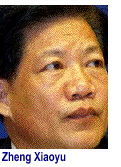
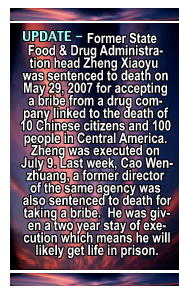 Although
China has steadfastly refused to initiate any meaningful safety reforms,
it wants the world to believe it has. When the diethylene glycol-laced
cough syrup was killing 100 people in Central America, 10 Chinese citizens
were killed after being injected with medications containing diethylene
glycol from the same company, Qiqihar No. 2 Pharmaceutical Company,
Ltd. The 10 were patients at Zhongshan University No. 3
Hospital in southern Ghangzhou. Zheng Xiaoyu, a member
of the ruling elite, and the head of the State Food and Drug Administration
was tried for accepting a bribe from Qiqihar No. 2 Pharmaceutical
Company, Ltd. He was found guilty and sentenced to death. Shanghai
prosecutors charged a brother and sister in a scam in which they sold
4 million yuan ($523 thousand) worth of fake health food products in 64
cities across China earlier this month. Fan Tongxue and his sister,
Fan Tongmei, could face death. Over 200 thousand people die each
year in China from consuming fake medicines or unregulated pharmaceuticals.
Although
China has steadfastly refused to initiate any meaningful safety reforms,
it wants the world to believe it has. When the diethylene glycol-laced
cough syrup was killing 100 people in Central America, 10 Chinese citizens
were killed after being injected with medications containing diethylene
glycol from the same company, Qiqihar No. 2 Pharmaceutical Company,
Ltd. The 10 were patients at Zhongshan University No. 3
Hospital in southern Ghangzhou. Zheng Xiaoyu, a member
of the ruling elite, and the head of the State Food and Drug Administration
was tried for accepting a bribe from Qiqihar No. 2 Pharmaceutical
Company, Ltd. He was found guilty and sentenced to death. Shanghai
prosecutors charged a brother and sister in a scam in which they sold
4 million yuan ($523 thousand) worth of fake health food products in 64
cities across China earlier this month. Fan Tongxue and his sister,
Fan Tongmei, could face death. Over 200 thousand people die each
year in China from consuming fake medicines or unregulated pharmaceuticals.
The reason the
United States—and Europe—is so forgiving of China's economic
indiscretions is because they believe China will open its doors and allow
its trading partners access to what could be the largest consumer base
in the world. As a result, according to former assistant US Trade Representative
Robert B. Cassidy, most American companies—and the US government—are
"kowtowing to China" in spite of the fact that the Chinese continue
to send adulterated, mislabeled and sometimes deadly foods, and counterfeits
of some of America's best known brands, to the United States. But it won't
happen.  China
has no intention of becoming a genuine trading partner with the world.
It is willing to tolerate intrusions by the West only because China needs
the types of consumers that only the industrialized world—in particular,
the United States, can supply. People with a lot of discretionary income
and not much sense on how and why they spend it.
China
has no intention of becoming a genuine trading partner with the world.
It is willing to tolerate intrusions by the West only because China needs
the types of consumers that only the industrialized world—in particular,
the United States, can supply. People with a lot of discretionary income
and not much sense on how and why they spend it.
Ming-jer
Chen, a business professor at the University of Virginia and an advocate
of global trade—particularly with China—feels a dramatic slowdown
in the free world buying goods of all types from China could have devastating
consequences."There is a cost, a huge cost, involved if the companies
or governments do not handle this well," he said.  "This
is a new concept for them—post-sale service, product liability, the
notion of a recall—because they are newcomers in the global economy."
Trade, as far as China
is concerned, is a one-way street. China has mastered the art of the carrot
on a stick. Only, their consumer market is an illusion. It doesn't exist.
Yes, China has a potential consumer market of between 1.3 to 2 billion
people. But, before you can call them consumers they must have an income
of sufficient size to purchase the consumer goods they want or need. Only
a very small percentage of the Chinese labor force— most of them
are employed by American or European companies—earn an income of
sufficient size to call them consumers. And China, selfishly, will not
let American or European companies sell them the products and/or services
that will drain their discretionary income.
"This
is a new concept for them—post-sale service, product liability, the
notion of a recall—because they are newcomers in the global economy."
Trade, as far as China
is concerned, is a one-way street. China has mastered the art of the carrot
on a stick. Only, their consumer market is an illusion. It doesn't exist.
Yes, China has a potential consumer market of between 1.3 to 2 billion
people. But, before you can call them consumers they must have an income
of sufficient size to purchase the consumer goods they want or need. Only
a very small percentage of the Chinese labor force— most of them
are employed by American or European companies—earn an income of
sufficient size to call them consumers. And China, selfishly, will not
let American or European companies sell them the products and/or services
that will drain their discretionary income.
China will allow the West to buy from China, but it will never fully allow Chinese vendors to buy from the West except in limited amounts—and only as long it serves the political interests and military objectives of Beijing. The US Trade Office is so enamored by the prospect of selling the largest consumer base in the world they've allowed themselves to be blinded by the simple reality that China trades with America only because it needs US dollars to buy the military apparatus necessary to destroy America and the free enterprise system. And, when you buy goods made in China, you are contributing to the demise of the free world.

Copyright © 2009 Jon Christian Ryter.
All rights reserved.


